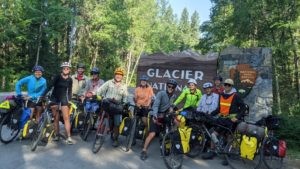
Day 1, Mile 1. I already had a white knuckle grip on my handlebar when I saw a gory dead deer on the shoulder, blocking my path. My option was to either swerve into traffic or go to the right of it and roll through deep gravel. The riders in front of me went through the gravel. I followed, but my tire slid out from under me and my bike went down hard. Suddenly, I was splayed out on the side of the road, eye to eye with the deer. I scrambled up, quickly noticed my scraped knees and broken bike rack and walked it off.
This was the moment I did not believe I would make it to Glacier National Park. In my head, I thought about the 25 more days we had left and wanted to start my escape plan.
Days rolled by and we met people who inspired us to take action; we saw sobering sights that reminded us of the size of the problem. It is easy to feel hopeless about climate change, easy to feel that no one person can make a difference.
By Day 7 we were biking a narrow highway. It was very hot, almost 100 degrees, with a steady wind. The hills were long. The shoulder was almost nonexistent.
Just past Ryegate, MT, we rode into a house built into the rocky slope. Inside, its open living room had a roof inspired by the pyramids. Jean Wallace built this house with her husband, and opened its doors to this group of smelly, sun-baked bicyclists.
She told us how her house was net zero energy and that the energy grid should actually be paying her because of the renewable energy contribution her house provides. I sat below the pyramid-inspired ceiling and pet her previously suspicious dog. I was in awe of her story of putting her values into action. And I knew I was surrounded by my classmates who were equally enthralled.
Seeing real people making real differences in ways they are passionate about has inspired me. Hearing Jean talk about how her passive solar house and seeing her wind turbine furiously spin outside, I knew I was in the right place. I thought back to our first day of biking and instead of thinking of a way out, I was thinking about how I could stay here just a little bit longer.
On Day 24, I woke up to the sound of someone saying, “Hey bear,” outside my tent. It was 3:45 AM. I quickly sat up and listened to the fading rustle in the nearby trees. I was about to go back to sleep when I realized it was time to get ready. Today, we would see Glacier National Park.
We climbed a 10-mile hill, 2,300 feet up a busy, winding road. As we started our descent on the west side of the Continental Divide, surreal mountains appeared, framing a deep valley decorated with cascading waterfalls—some far away, some right by my shoulder, splashing on the road. In my heart I knew that everything leading up to this moment was worth it.
Daniel Lombardi, one of our final guest speakers, was a climate change communications specialist for the National Park Service. He led us through a consideration of some of the ways climate change is affecting Glacier National Park. But mostly he led us to consider solutions.
So much of what we have observed and talked about are issues that climate change has affected and that today’s society face. We witnessed the aftermath of a huge forest fire, saw how much glaciers had shrunk in only a few years, and biked though a week-long heat wave in June. Dan led us on an activity where we wrote about these climate issues and then passed it to someone else so they could come up with a solution. Daniel was worried we wouldn’t have anything to suggest, but to his surprise, everyone easily came up with unique proposals for building resilience against climate change.
Leila posed the problem that the large lakes near Madison, Wisconsin, aren’t remaining frozen through the winter. Dominic’s solution was to set up a public ice rink when the lake was frozen. The “admission” would be to take a climate change quiz, so that skaters would engage with the problem that was shortening their skating season.
This trip has been eye-opening and inspiring. Had I not applied to be here, I never would have connected with these amazing people and learned that there are so many others like me who wanted to come together and work on these issues that we all are so passionate about. Not only will we all be leaving here with the knowledge and experience of cycling through the Rockies and talking to groundbreaking people, but I think we will all leave with just a little more passion and the courage to do something great.
Rachel French is a student at the University of Wisconsin-Madison studying Kinesiology.